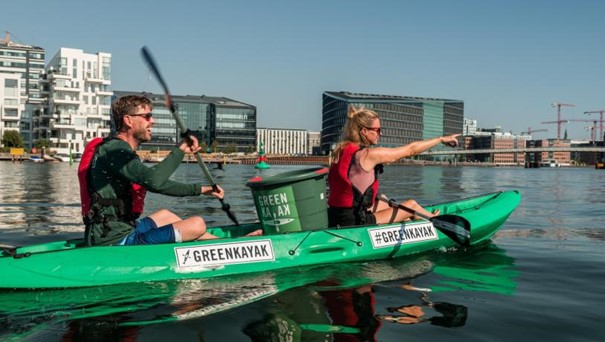Several tourist destinations are now planning to adopt a local version of the Copenhagen initiative, CopenPay, which enables tourists to “pay” for local experiences with conscious actions and give back to the destinations they visit. Now, global tourist destinations are adopting Copenhagen’s praised initiative to promote more conscious travel.
Massive popular resistance, water guns, and locals demonstrating are the reality in many big cities and popular tourist destinations around the world, where tourism faces issues with overcrowding and visitor behavior. In clear contrast to these negative scenarios, Copenhagen has taken a forward-thinking initiative by engaging and rewarding tourists for their behavior. CopenPay aims to inspire and nudge travelers about the choices they make while traveling.
Copenhagen offers free boat tours, bike rentals, and even a free lunch to tourists who collect litter, choose public transportation, or help out in a communal garden. Last summer, the Danish Capital launched a new positive approach to tourism – CopenPay, rewarding tourists for making more conscious choices. For its second run this summer, Copenhagen now also rewards tourists who arrive by train and is further encouraging tourists to travel less by offering more extended stays.
And now the positive Copenhagen approach is spreading internationally, as several cities and tourist destinations plan to create their own local incentive schemes inspired by ‘CopenPay’.

Berlin, Bremen, and Helsinki
Since launching the CopenPay initiative, Wonderful Copenhagen, the tourist board of Copenhagen, has been in contact with a wide range of other cities and tourist destinations, all of which are interested in adopting a local version of CopenPay.
“Since launching CopenPay last summer, we’ve been met by an enormous interest from cities and tourist boards from Europe, Asia, and North America, all wanting to know more about CopenPay and our learnings. So far, we have shared insights on CopenPay with more than 100 interested parties. As we aim to contribute to a positive change globally, we are happy to share,” says Søren Tegen Petersen, CEO at Wonderful Copenhagen.

One of those cities considering its own version, inspired by Copenhagen, is Berlin.
”CopenPay stands out as an inspiring example of how creative measures can effectively raise awareness for more sustainable travel. In Berlin, we share this ambition and are currently considering setting up a similar concept tailored to Berlin, in close collaboration with our partners from the visitor economy,” says Sabine Wendt, CEO of VisitBerlin.
Also, the capital of Finland is considering local initiatives, inspired by CopenPay:
“CopenPay is a great initiative, and we would be delighted to build upon that spirit in collaboration with other destinations — aiming even higher, together. As a city situated by the sea, Helsinki is eager to collaborate across the Nordics and the Baltics to promote regenerative tourism and to launch a shared initiative focused on the restoration of the Baltic Sea”, says Tourism Director Nina Vesterinen, City of Helsinki.
In the German city of Bremen, they’ve launched a cooperative campaign with Deutsche Bahn, now developed further, inspired by CopenPay:
“This year, Bremen Tourism once again launched a cooperative campaign with Deutsche Bahn to put the spotlight on sustainable travel. CopenPay served as a major inspiration, guiding us to develop new, creative ways to reward climate-friendly travel behavior actively. Overnight guests arriving in Bremen by train received a surprise bag filled with vouchers and small gifts from various local tourism businesses. Our visitors received the campaign very well and have encouraged us to expand the concept further, thereby strengthening Bremen as a sustainable destination. For 2026, we are planning an even larger initiative,” says Oliver Rau, Managing Director of Bremen Marketing and Tourism, Wirtschaftsförderung Bremen GmbH.

Global potential says expert
The UN projects a steep increase in global travel, with the number of arrivals expected to rise globally from 1.4 billion in 2019 to 1.8 billion in 2030 – underscoring the need to reconsider how we travel. And CopenPay is all about raising awareness about the choices we all make as tourists.
The potential for developing local versions inspired by the Copenhagen initiative extends to destinations around the globe, says Rodney Payne, CEO of Destination Think, a Canada-based consulting agency specializing in forward-thinking development in the global tourism industry.
“With CopenPay, Copenhagen proves that bold ideas can inspire global change. This innovative model shows other destinations how to engage visitors in ways that are both sustainable and deeply connected to local life, where travelers become active participants rather than passive consumers. So CopenPay holds huge potential for destinations around the world to adopt into their own local version,” says Rodney Payne.
Global tourist destinations are adopting Copenhagen’s praised initiative to promote more conscious travel, based on a press release from Visit Copenhagen.
Feature image (top) © Daniel Rasmussen.


